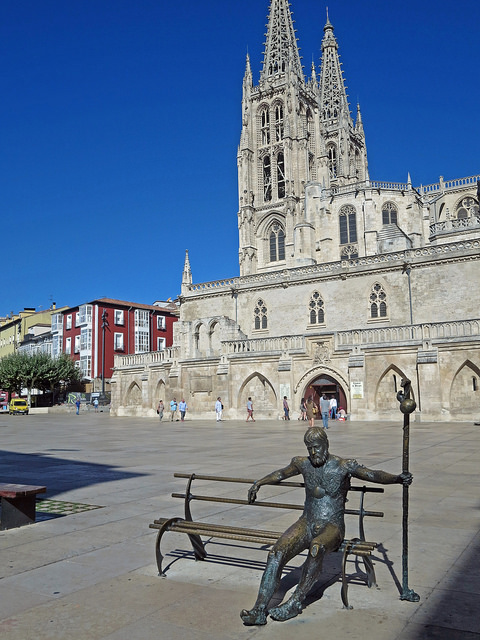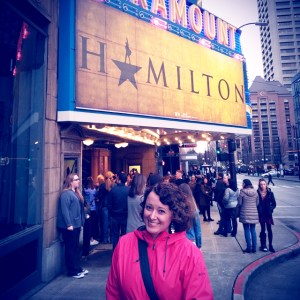A couple of weeks ago (yeah, I’m behind with my writing) I did something I’d never done before. I went to a play by myself.
And not just any play. I went to THE play. Hamilton.
The story of how I got there is long and not very interesting. Short version: I have been geeking out on the cast album and Hamilton-themed books for more than a year, and when the traveling show came to Seattle and an opportunity for a last-minute ticket appeared, I did not throw away my shot. And it was fantastic. Totally worth it.
So why am I telling you this? Because as much as I wanted to be “in the room where it happens” I’m not sure that I would have jumped in if it wasn’t for another, Camino-related experience.
Last summer, I also found myself traveling alone in a sea of people. When my feet started acting up again on Camino 1.3, I decided to stop walking two days early and found myself alone in Burgos, with a day to kill before it was time to travel again.
My friend Laurel, who always intended to walk on to Santiago without me, hugged me goodbye before dawn and set out for the Meseta. I slept longer, but eventually gathered my belongings and left the municipal albergue at about 8.
To be honest, I felt a little lost.
What do I do in Spain if I’m not a pilgrim?
What do I do in Spain if I’m by myself???
These aren’t dramatic questions. Many, many people walk the Camino alone, and travel to new places alone, and they have a fantastic time doing it. In theory, I’m the introverted, independent type of person who should thrive traveling alone, as well. But for the past twenty years or so, that hasn’t been my story. I mostly travel with Eric, and even when he hasn’t been with me, I realized I’ve always had a traveling companion.
So this day in Burgos felt charged somehow. I could do whatever I wanted (as long as it didn’t involve a lot of walking). I could linger without worrying about anyone else’s pace, or boredom, or interest. At the same time, I couldn’t rely on anyone else’s skills for navigation or language, or abdicate responsibility with an “I don’t know; what do you want to do?” I owned this day completely, in a way that felt rare and special.
Burgos was still mostly asleep that early, the streets deserted and the cafes closed. I circled the cathedral a few times at first, looking at the details of the many, many Gothic carvings and the way the morning light played on the steeples.
I found a café on the square and ate a leisurely breakfast of croissant and coffee, catching up on my journal and watching the tourists start to fill the area. These weren’t Camino pilgrims – yesterday’s group was already on the trail, and it was too early for the new batch to start arriving. These were families on holiday, or people from around the world dragging wheeled luggage and wearing clothes that probably weren’t washed in a sink.
Finally, when the cathedral opened, I bought a ticket and went in. I concentrated on lingering. I paused everywhere, listening to the audio tour as it wound through dozens of chapels.
If I started to feel anxious, my mind pushing toward the next thing, I stopped. It was cool inside (and the heat of August was only rising outside), and there were plenty of places to sit and rest. Why rush? No one was waiting for me. I had nowhere else to be.
I considered every person buried under those Gothic domes, from the original architect to El Cid himself. I poked into corners and considered staircases that rose to showy doors, which in turn just led outside. I paused to study the carvings and paintings on the walls, and the light in the windows. I waited until the “fly catcher” clock chimed, the odd figure above it opening its mouth with each strike of the hour, as if to catch flies.
When I finally emerged, it was after noon. The albergue, where I was storing my backpack, would open soon. I went back to sit at the café across the street, greeting and watching the pilgrims arrive, but it felt strange to be among them. I was cool and comfortable in my after-walking sundress and sandals. They were tired, dusty, talking together about the things that they’d seen. It felt like this wasn’t my place any more.
I gathered my bag and set out for my hostal, which was still in the old city, but in a corner I’d never explored before. I followed a canal instead of the yellow arrows, and climbed a set of narrow stairs to a second-floor lobby, and then to a tiny orange room the size of an American closet, with a single bed and a tiny bathroom.
I napped, then ventured back into the city, wandering streets until my feet ached, and then sitting in parks and watching the people passing by while I recovered.
One of the things I love most about Spain is the way that everyone comes outside in the evenings. Kids careened around public squares, chasing soccer balls or each other. Parents and grandparents sat in clusters and visited, their hands gesturing broadly as they talked. I didn’t see a single cell phone. Even the teenagers were talking to each other (or sitting around looking bored).
I snacked on tapas here and there, and at 9:00 stopped for a final glass of wine at a café near my hostal. I may not be a pilgrim any more, but my body was still on pilgrim time. I sat at a table outside, next to a group of well-dressed women who’d obviously just come from the evening mass. An older nun was in the middle of the group. They sipped their drinks – still appetizers for them, with dinner at least another hour away – and gossiped about the crowd. Occasionally, I’d see their eyes rest on me.
I want to tell you that it was all magical and perfect, that I was content and happy to observe the busy city from my quiet corner. But to be honest? Parts of that day were hard. I was physically tired after 9 days of sleeping in albergues. I was culturally tired after almost two weeks of patching together my rusty Spanish.
Being alone in Spain wasn’t the same as being alone on the Camino, where people from around the world were used to reaching out. Those tapas snacks sometimes involved me walking around a block two or three times, gathering the courage and practicing the words to interact with a waiter. Sitting at the bar alone meant squaring my shoulders and being okay that I was the only person at a table alone.

But that doesn’t mean it didn’t have its own magic. Without the distraction of a companion, I formed much deeper memories of Burgos. I fell more in love with the cathedral, the streets, the people.
Author Shauna Niequist says, “When you’re traveling with someone else, you share each discovery, but when you are alone, you have to carry each experience with you like a secret, something you have to write on your heart, because there’s no other way to preserve it.”
Six months later, that day in Burgos is still written on my heart.


















2 thoughts on “A Day Alone in Burgos”